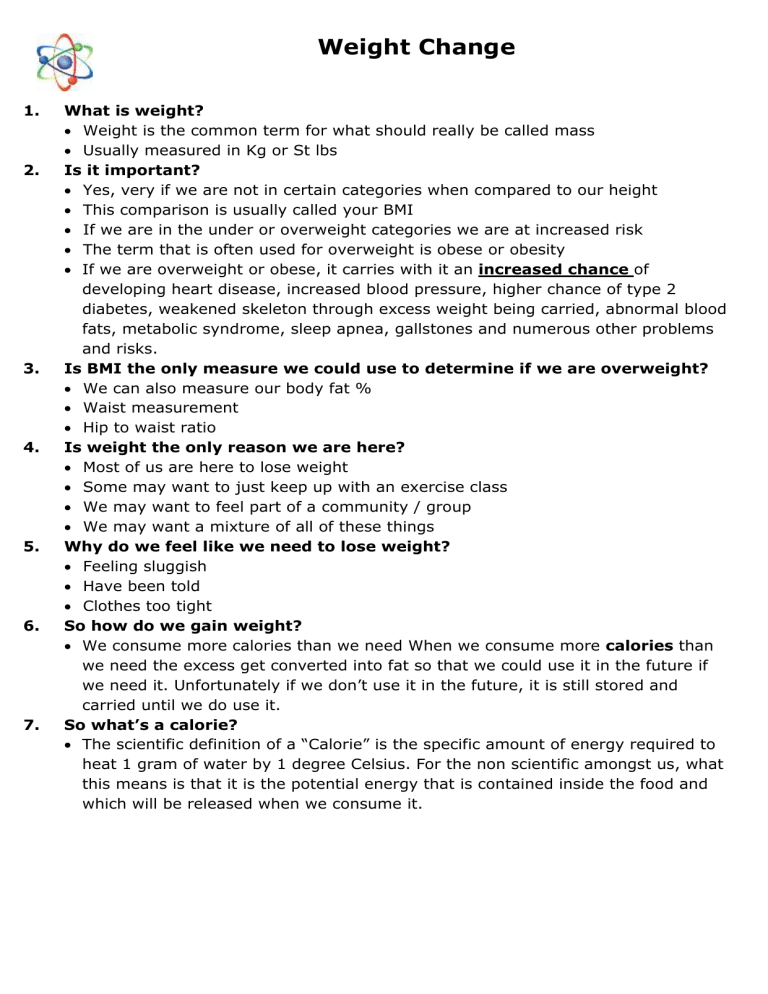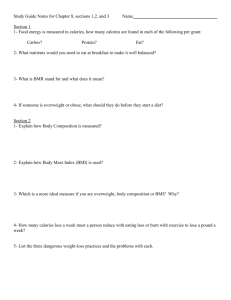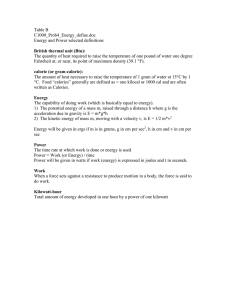
Weight Change 1. 2. 3. 4. 5. 6. 7. What is weight? Weight is the common term for what should really be called mass Usually measured in Kg or St lbs Is it important? Yes, very if we are not in certain categories when compared to our height This comparison is usually called your BMI If we are in the under or overweight categories we are at increased risk The term that is often used for overweight is obese or obesity If we are overweight or obese, it carries with it an increased chance of developing heart disease, increased blood pressure, higher chance of type 2 diabetes, weakened skeleton through excess weight being carried, abnormal blood fats, metabolic syndrome, sleep apnea, gallstones and numerous other problems and risks. Is BMI the only measure we could use to determine if we are overweight? We can also measure our body fat % Waist measurement Hip to waist ratio Is weight the only reason we are here? Most of us are here to lose weight Some may want to just keep up with an exercise class We may want to feel part of a community / group We may want a mixture of all of these things Why do we feel like we need to lose weight? Feeling sluggish Have been told Clothes too tight So how do we gain weight? We consume more calories than we need When we consume more calories than we need the excess get converted into fat so that we could use it in the future if we need it. Unfortunately if we don’t use it in the future, it is still stored and carried until we do use it. So what’s a calorie? The scientific definition of a “Calorie” is the specific amount of energy required to heat 1 gram of water by 1 degree Celsius. For the non scientific amongst us, what this means is that it is the potential energy that is contained inside the food and which will be released when we consume it. 8. 9. 10. 11. 12. 13. 14. 15. 16. 17. So how do we lose weight? We use up more calories than we consume. So do I just need to burn off more than I consume to lose weight? There are other issues which could cause people to gain weight, these are: hereditary condition such as an underactive thyroid, certain medications side effects, starving yourself then pigging out and doing not being active at all, but the main thing you should be focused on is burning off more than you consume as this will have the biggest effect. So losing weight is like an old school balance? Introduce the old school style balance Label sides Introduce cards for what has already been discussed What goes on each side of the balance? Food in Exercise Out Why doesn’t it seem to work, what’s missing? Metabolism isn’t represented Actually called your Basal Metabolic Rate What is Basal Metabolic Rate (BMR)? BMR is the amount of calories that you need just to live It is the energy we need to digest food, breathe, pump blood, think, see etc How do I know what my BMR is? BMR varies due to Age, Gender, Height, Weight and Muscle mass There is an equation developed in the 1920s that is used to calculate it Go online and you can get figures (eg mine is 1,520 calories) A woman 30, 5’7”, 210lbs (15st) = 1,740 / same woman at 140lbs (10st) = 1,437 On a given day you can vary how much exercise you do as well as the amount of calories you consume but you cannot realistically affect your BMR The only real way to immediately influence gain / loss is diet & exercise What works best for weight loss – healthier diet or more exercise? For weight loss diet works better than exercise, roughly 3:1 If that’s the case why do we bother to exercise? We are developed to be active, not sedentary Exercise doesn’t just help you lose weight Go back to all of the points in Q2 What is best overall? Overall a combination of both good diet and exercise will really help us to lose weight


